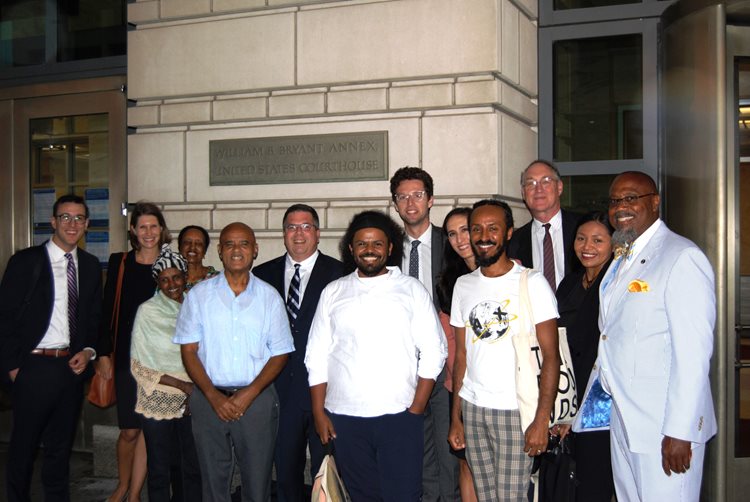Issues & Trends
Cleaning Up the District’s Clean Hands Law
September 06, 2023

Tzedek DC staff, pro bono attorneys, and plaintiffs after a hearing in Ayele v. District of Columbia.
Tzedek DC, a nonprofit committed to addressing debt and consumer protection issues impacting the District’s low-income residents, continues to fight to protect residents from provisions in the District’s “Clean Hands” law that the nonprofit claims are unconstitutional as applied and reinforce inequalities and penalize poverty in the city.
Fresh from its victory of securing a preliminary injunction in December 2022 that halted the District’s enforcement of a Clean Hands provision barring residents who owe the city more than $100 in fines or fees from renewing or obtaining a driver’s license, Tzedek DC is targeting the Clean Hands Law’s application to occupational and small business licenses. Under the law, individuals owing $100 or more in fines or fees are automatically barred from acquiring such licenses.
“These denials have the same constitutional flaws and racially disparate impacts identified in Parham [v. District of Columbia],” said Tzedek DC President and Director-Counsel Ariel Levinson-Waldman. In Parham, Tzedek DC and Venable LLP asserted that the provision preventing D.C. residents from getting their licenses because of outstanding debt violated their clients’ constitutionally protected due process rights. They also argued that the law disproportionately impacted Black residents and prevented them from earning an income and managing their daily lives.
Now, working with the Washington Lawyers’ Committee for Civil Rights and Urban Affairs and counsel from Weil, Gotshal & Manges LLP, Tzedek DC is advancing the same argument in federal court in Ayele v. District of Columbia. At a recent hearing, the judge declined to render a decision in the plaintiffs’ request for preliminary injunction and suggested that the parties discuss whether a mediated resolution could be found.
Until then, the Ayele litigants remain barred from the occupations that could help them pay their debts, support themselves, and improve their circumstances.
In July 2022, the D.C. Council eliminated the Clean Hands provision that had prevented D.C. residents with outstanding fees and fines from renewing their driver’s license, but the amendment would not have taken effect until October 2023. Citing continuing “irreparable harm” to the plaintiffs, the U.S. District Court for the District of Columbia granted Tzedek DC’s motion for a preliminary injunction in December 2022.
In her opinion, U.S. District Judge Colleen Kollar-Kotelly noted that the plaintiffs “are just some of the tens of thousands of DC residents who have been barred from receiving driver’s licenses under the Clean Hands Law. In addition to the specific and grave harms suffered by each resident, the law has had broader societal impacts.”
Citing a report by the D.C. Council Office of Racial Equity, Judge Kollar-Kotelly said that “ending the application of the Clean Hands Law to driver’s licenses will likely improve … [the] quality of life outcomes for Black residents who have a debt to the District government” and will “mitigate the burden on D.C. residents with disabilities, those who lack stable housing, and those who are struggling to maintain steady employment.”
As a result of Parham, the D.C. government agreed to pay a portion of Tzedek DC and Venable’s pro bono fees, and former plaintiffs or their families received up to $3,000 to help them repay outstanding fines and fees or otherwise address financial hardships.
“It’s a new lease on life … I have had a permit and a driver's license since I was 16 years old. So, when I was stripped of my driver's license, I felt empty. A sense of belonging had been taken away,” said Parham plaintiff Carlotta Mitchell in an interview with Tzedek DC.


